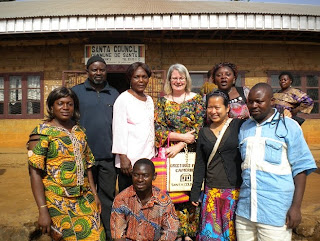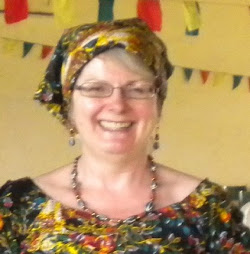More goodbyes - 13 of us new volunteers arrived together just 8 weeks ago and with just 4 of us going back to the UK together, it feels like a family parting, not knowing when we will see each other again. We've supported each other while settling in, made deeper connections as individuals through the intensity of this experience in Cameroon, and I hope we can continue to keep in touch across the continents.
 A long bus journey to Yaounde gave us the chance to drink in the sights and sounds of rural African life for the last time. We noticed areas of comparative wealth - like the large town of Bafoussam where garden plants are on sale in pots to adorn the homes of the richer residents. Yaounde, the capital, was just as hot and humid as we remembered. The hotel electricity flicks off every evening, but luckily comes on again later so we get air conditioning, and I actually used a blanket for the first time!
A long bus journey to Yaounde gave us the chance to drink in the sights and sounds of rural African life for the last time. We noticed areas of comparative wealth - like the large town of Bafoussam where garden plants are on sale in pots to adorn the homes of the richer residents. Yaounde, the capital, was just as hot and humid as we remembered. The hotel electricity flicks off every evening, but luckily comes on again later so we get air conditioning, and I actually used a blanket for the first time! Tedious paperwork at the VSO offices, reclaiming travel expenses, seemed to take most of Friday, and was rather a dull end to our relationship with VSO Cameroon. Not that we expected a thank-you party, but some sort of end-of-placement review would have been nice. We were glad that our flights were confirmed, after all the uncertainty of the volcano problems, and celebrated our last night in Cameroon with a candlelit dinner (no choice as the electric had gone off again!)
On Saturday we did the tourist thing - by taxi to the central market, a huge spiral of a building, where we were instantly snapped up by men wanting to lead us to our purchases. (They also wanted us to have their babies, marry them, take them to the UK etc etc). We also visited the cathedral, to hear wonderful singing at a wedding, then went off in search of more traditional crafts.
A big market at Tsinga is the place to go, full of stalls with wood, pottery, metal and basket work, musical instruments, masks - everything you could wish for. It was hot, and I watched a football game across the road while waiting for my friends to finish bargaining. No room in my cases for more stuff - thank goodness I've given away so much already.
All packed up and at the airport by 6:15pm, we queued for 4 hours or more to check in, hassled by an increasingly drunken man who seemed to think he owned our trolley. I'm quite good at French but couldn't understand why he wanted us to clingfilm our bags. When we finally reached the check-in we realised why it all took so long; several people had to weigh and search all the cabin bags, and at least 4 people separately checked passports and visas. Please note - pack all your souvenirs in the hold luggage. By the time we got through, the airplane was boarding, and we had to hurriedly spend our last francs on Swiss chocolate!
A comfortable but late overnight flight got into Paris with barely enough time for passengers to run and make the connecting plane to London. Only when we arrived at Heathrow did we realise that 2 of us had missed it, and so had our luggage! Still, I was glad to get the bus to Swansea - a whole seat to myself - and having no heavy cases certainly made it easier to manage the bus/train up to Llandeilo.
How quiet it is! To be truly on my own, for the first time in 2 months, seems strange. Nice to see my home (freshly painted while I've been away) and cats, talk to my daughters in lengthy phone calls, share a bottle of white wine with friends, admire the garden's spring flowers, get my hair cut. The luggage arrived late Tuesday afternoon so now I can unpack and try to wash out the red dust of Cameroon. Time now to reflect on lessons learned, to think about how to share my learning with my organisation and others, and how to continue to help people in Cameroon to develop in the way they want.



















































